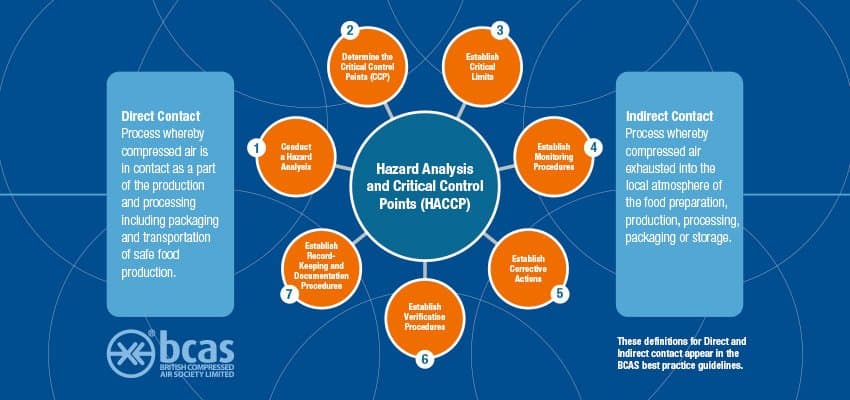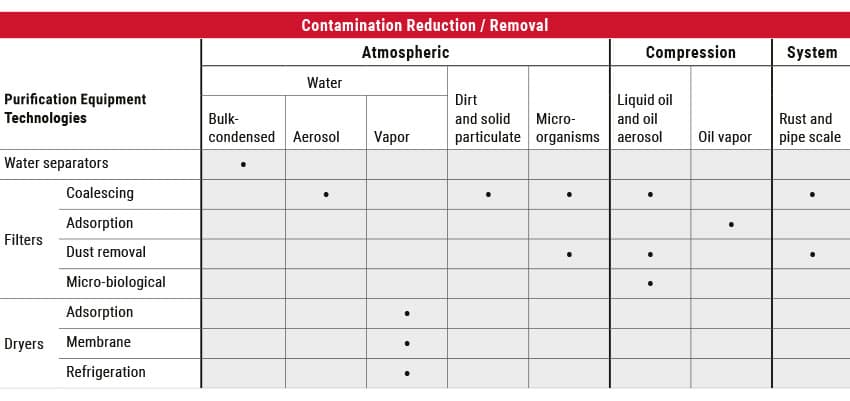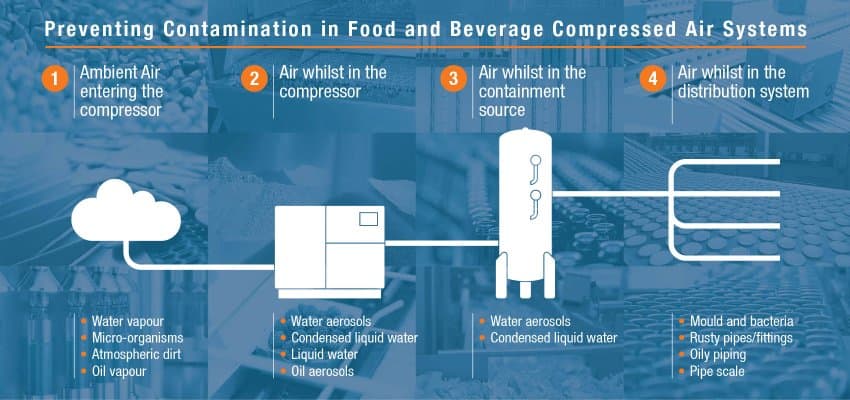Cambs Compressors are highly experienced in designing, installing, supporting and maintaining compressed air systems in this sector – and have worked to the most exacting hygiene standards applying to the processing of food and beverages in the UK.
Reducing Contamination Risks of Compressed Air in UK Food and Beverage Plants
Using compressed air in the UK food and beverage industry is governed by compliance standards. These standards differ depending on whether the compressed air comes into direct or indirect contact with food or food contact surfaces. Compressed air is used at multiple stages from the source of ingredients through to the production, processing, handling, packaging and transportation.
Compressed air that comes into direct contact with the food (Contact)
The ISO 8573-1 standard outlines the maximum allowable levels of contaminants, including particles, water and oil for compressed air that comes into direct contact with food or food contact surfaces. Which means any compressed air used in processes such as blowing, drying, or conveying food products, must adhere to the requirements of ISO 8573-1.
Indirect compressed air which may come into contact with the food (Non-contact)
Compressed air used indirectly in the food industry, (e.g. compressed air used for tasks like powering pneumatic tools, operating packaging equipment, or conducting maintenance), is expected to be free from contaminants that could potentially pose a risk of indirect contamination. Adhering to the general principles of good manufacturing practices (GMP) and employing oil-free compressors to ensure the quality of compressed air used is as contaminate free as possible.

Hazard Analysis and Critical Control Points (HACCP):
The HACCP system, a risk-based approach to food safety, is relevant for both direct and indirect uses of compressed air in the food industry. It involves identifying critical control points and implementing measures to prevent potential hazards.

Monitoring and Verification, a Continuous Cycle.
By selecting an ISO 8573-1:2010 class 0 oil-free centrifugal compressor, you can rest assured that you are not adding oil into your compressed air process, thus leaving you free to direct your attention and efforts to reduce the risks posed by particles and humidity. Centrifugal technology also boasts other user benefits including reduced operating expense, lower maintenance costs and less downtime
The food safety laws, such as SQF and FSMA do not specify required testing methodologies and frequency, only that monitoring must be done on a regular basis to ensure that the air is contaminant-free.
Highly experienced in working to the ISO 8573-1
Cambs Compressors understand the importance of exceptional air hygiene in the food and beverage industry. Our innovative solutions are designed to offer safe air quality for food production. While ISO 8573-1 provides a comprehensive framework for assessing compressed air quality in direct contact with food, adherence to good manufacturing practices, hygienic design principles, and HACCP principles is crucial for ensuring the safety and quality of compressed air used indirectly in the food production process.
Our design, installation and maintenance solution ensure you:
- Prevent, monitor & maintain air quality: rusty pipes, excess water, oily piping, mould and bacteria, compressor fittings, distribution piping, storage receivers
- Meet Certification Requirements: SQF– Safe Quality Foods, FDA – Food and Drug Administration, BRC – British Retail Consortium, PrimusGFS – GFSI Scheme
- Meet Equipment Requirements: Class 0 Oil, Clean Dry Air, Particle-free
Cambs Compressors experience in providing clean air to the relevant standards is based upon designing and maintaining systems for science laboratories, pharmaceutical production, breathing air, and the food processing industries. We work to the SO 8573-1 standard and any other relevant standards you require. Our work is independently testing to ensure the air quality adheres to the standards set.



